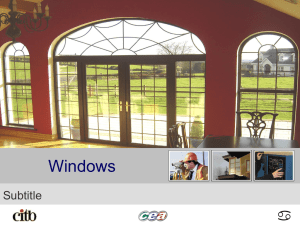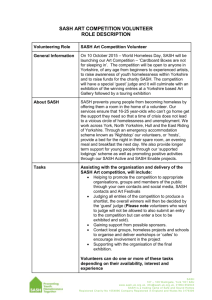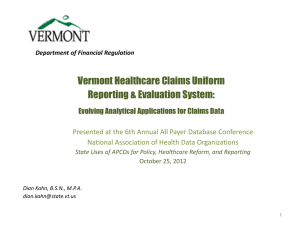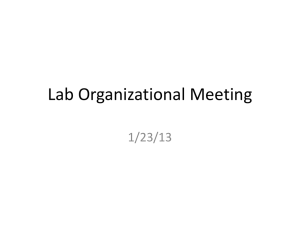Department of Vermont Health Access
advertisement
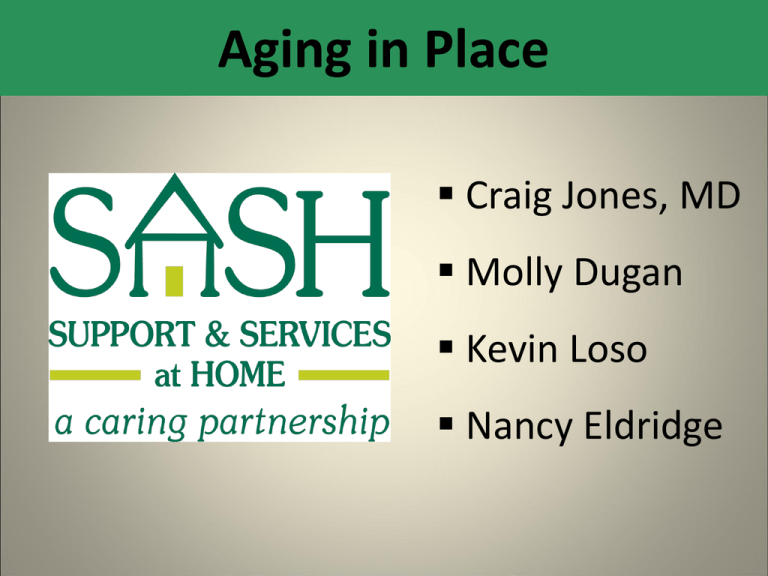
Aging in Place Craig Jones, MD Molly Dugan Kevin Loso Nancy Eldridge We All Want to Stay Home • Home centric • Consumer driven • Unlicensed WE BUILT AN EDUCATION SYSTEM FOR THE BABY BOOMERS IN 1953 NOW THEY NEED A LONG TERM CARE SYSTEM! A Network of Care Management HUBS All Incomes, Ages and Settings Medicare Dual Eligibles Others?? + 150 HUBS Housers at Health Reform Table with the State Home Health Housing Hospital Funder Mental Health AAA PACE University The Technology Embedded Home Central Clinical Registry iPads Tele-Tai Chi Broadband for all! Cyber Seniors THE SAVI!! THANK YOU ENTERPRISE COMMUNITY PARTNERS!! How Will Our Residents Benefit? HEALTHY HOMES CARING COMMUNITIES POSITIVE AGING! Housers Working Together Non-Profit Housers CCRC’s Public Housing Authorities Land Trusts Assisted Living Residential Care Facilities Department of Vermont Health Access Vermont Blueprint for Health Community Systems of Health Housing Assistance Council June 5, 2012 4/13/2015 10 Department of Vermont Health Access Building A Foundation For The Future Advanced Primary Care Practices (PCMHs) Community Health Teams (core) Community Health Teams extended(MCAID CCs, SASH Teams) Multi-insurer payment reforms Health Information Infrastructure Evaluation & Reporting Systems Learning Health System Activities 4/13/2015 11 Department of Vermont Health Access Hospitals Advanced Primary Care Specialty Care & Disease Management Programs Social, Economic, & Community Services Community Health Team Nurse Coordinator Social Workers Nutrition Specialists Community Health Workers Public Health Specialist Advanced Primary Care Advanced Extended Community Health Team Primary Medicaid Care Coordinators Care SASH Teams Advanced Primary Healthier Living Care Workshops Mental Health & Substance Abuse Programs Public Health Programs & Services Health IT Framework Evaluation Framework Multi-Insurer Payment Reform Framework 4/13/2015 12 Department of Vermont Health Access Financing Payment Reform Fee for Service - Volume $ PPPM (NCQA) - Quality Medicaid Medicare BlueCross MVP Cigna Self Insured Delivery System Reform Advanced Primary Care NCQA Standards Patient Centered Care Access Communication Guideline Based Care Use of Health IT Community Support Shared Costs - Utility Community Health Teams MCAID CCs SASH Teams Specialized Services 4/13/2015 Hospitals Specialty Care Mental Health Services Substance Use Services Family Services Social Services Economic Services Long Term Care 13 Nursing Homes Blueprint Information Technology Architecture Hospital-owned Primary Care Practices Hospital hosted EMR Central Registry • Visit planners • Care coordination • Reporting Data warehouse Core data elements FQHC-owned Primary Care Practices Vermont Core data elements FQHC hosted EMR (VHIE) Core data elements Unique Patient identification information EMR Web Access Primary Care Practice No EMR Central Clinical Registry (Covisint-DocSite) Web Access Independent Primary Care Practices Core data elements Health Information Exchange Core data elements Community Health Team Blueprint Expansion January 2012 4/13/2015 15 Department of Vermont Health Access 16 4/13/2015 Gifford CME 3-2-2012 17 Department of Vermont Health Access Care Management Begins at Home Multi-payer Advanced Primary Care Practices (MAPCP) Medicare Demonstration States Maine North Carolina Michigan Pennsylvania Rhode Island Vermont Minnesota New York Integrated Care for the Dually Eligible California Connecticut Colorado Massachusetts Michigan Minnesota New York North Carolina Oklahoma Oregon South Carolina Tennessee Vermont Washington Wisconsin Department of Vermont Health Access Data Sources & Evaluation Central Clinical Registry Multi-payer Claims Database Chart Reviews NCQA Scoring Public Health Registries Patient Provider Qualitative Assessment Patient Experience Department of Vermont Health Access Early Trends – Inpatient Discharges 50% 38% 40% 30% 20% Inpatient Discharges Participants 13% 10% Inpatient Discharges Controls 7% Inpatient Discharges Statewide 5% 2% 1% 0% -2% -10% -10% -16% -20% % Change 2007-2008 (Baseline) % Change 2008-2009 (Start-up) % Change 2009-2010 (Operations) Department of Vermont Health Access Early Trends – Inpatient Discharges (Rate / 1000) 60.0 50.0 40.0 30.0 Inpatient Discharges Participants Inpatient Discharges Controls Inpatient Discharges Statewide 20.0 10.0 0.0 2007 2008 2009 2010 Department of Vermont Health Access Blueprint Team Craig Jones, MD Lisa Dulsky Watkins, MD Jenney Samuelson Terri Price Diane Hawkins Beth Tanzman Pat Jones Julie Trottier (Milbank Fellow) 4/13/2015 25 SASH is a System, Not a Type of Housing All settings – all ages – all incomes Access to information for housing based staff Population based – plus targeting SASH as an extender to the Blueprint for HealthVT’s Medical Home Model. What are the Essential Elements? Person-centered – Population based SASH Staff Team Based Care Management Information Sharing through Technology Prevention and Wellness through Healthy Living Planning Volunteers SASH Keeps “Katie” in the Driver’s Seat SASH Staff = Trusted Guides Multi-Agency Team Based Care Management Nonprofit Housing PACE Comm. Mental Health Agency Visiting Nurse Assoc. Area Agency on Aging The SASH Teams Care Manager Assessments Wellness Nurse Person Centered Plans Acute Care Nurse Individualized Supports Case Manager Transitions Support Mental Health Expert Self-Management of PACE Intake Chronic Conditions Care Coordination Prevention and Wellness Volunteers! Where are we now? Started rolling out in October 2011 Currently have 19.5 panels up and running! 1,950 people have access to SASH supports. 57 affordable housing sites are SASH sites DocSite- Statewide Repository of Data is online. Vermont’s SASH Goes Statewide SASH and the Blueprint for Health • An Extension of the Community Health Team • Support for Goals of the Medical Homes • CHT Case Manager Representation on Functional Team • SASH Representation on CHT Planning Committee • SASH Representation on CHT Referral Committee Rutland County SASH Community Partners • • • • • • • Rutland Regional Medical Center (RRMC): Social Work Department RRMC: Case Management Department (Discharge Planners) RRMC: Community Wellness Programs Rutland Area VNA & Hospice – Nursing and Wellness Services Southwestern VT COA– Case Management and Programming PACE Vermont – Intake Coordination Rutland Mental Health Services – Elder Care Clinician & Case Management • Southern VT Area Health Education Center – Interns • Vermont Department of Health – Programming • Castleton State College, School of Nursing – Interns SASH and the Blueprint for Health The Pines of Rutland (SNF) – Discharge Planning Vermont Division of Disability & Aging Services – Choices For Care Community Health Center of the Rutland Region (FQHC) – Medical Homes Albany School of Pharmacology – Interns The BUS – Transportation Local Farmers – Nutrition Programs Castleton Community Center – Programming Retired Senior Volunteer Program – Volunteers Lions Club – Vision Program LensCrafters – Vision Program SASH Local Table Engages key community leaders in SASH Provides support, guidance and general oversight Represents interests of the SASH population Members include leaders representing community partners, other providers, and other community stakeholders SASH Local Table Roles & Responsibilities General promotion of SASH to the community Reviews strategic direction and priorities Reviews protocols and services Support in seeking funding sources Reviews reports Provides specialized experience Reviews processes, data and outcomes Supports overall development and sustainability SASH Local Table Roles Responsibilities Profile of&Residents Templewood Court 49 residents enrolled 39 females 10 males Average age: 72 years old Average # of prescription medications taken: 7 Have 3 or more medical conditions: 90% Have 5 or more medical conditions: 55% Sheldon Towers 40 residents enrolled 17 female 23 male Average age: 58 years old Average # of prescription medications taken: 6 Have 3 or more medical conditions: 80% Have 5 or more medical conditions: 55% Profile of Residents Templewood Court Failed cognitive screening: 39% Used ER: 43% Have self-reported mental health concern: 33% Have moderate to high nutritional risk: 83% Sheldon Towers Failed cognitive screening: 12% Used ER: 48% Have self-reported mental health concern: 45% Have moderate to high nutritional risk: 75% Profile of Residents Templewood Court Sheldon Towers Top 5 Medical Conditions Top 5 Medical Conditions – – – – – Vision Arthritis High Blood Pressure Heart or Circulatory Problems Chronic Pain 33% have fallen in last year – – – – – Vision High Blood Pressure Arthritis Depression Chronic Pain 33% have fallen in last year Community Program Support Castleton State College Nursing Programs Internship Program Vermont Center for Independent Living Hunger Free Vermont Nutritional Program Council on Aging; AmeriCorps Members – Tai Chi, Walking Program Beauchamp & O’Rourke Pharmacy – Brown Bag Medication Review, Diabetes Education Castleton Community Center – A Matter of Balance RRMC – Eat Well Feel Great Information Sharing Housing Staff Nursing Homes/Rehab Facilities Community Providers (VNA, AAA, Mental Health) Primary Care Provider Community Health Team Family Support Persons Hospital Benefits to Residents Enhanced quality of life Decreased isolation Increased physical activity Improved nutritional status Increase in primary care Vision issues addressed Reduction in ER and SNF utilization Earlier treatment of health issues SASH Benefits To Housers 1. 2. 3. 4. 5. 6. Added supports for a changing resident population Liability exposure reduced Increase in on-site support staff Operate without a blindfold Application of evidence-based practices Integral part of home & community-based services aging network 7. Part of linking non-profit assets 8. Sustainable funding for services 9. Place at the health care table 10. Benefit from a collaborative network
